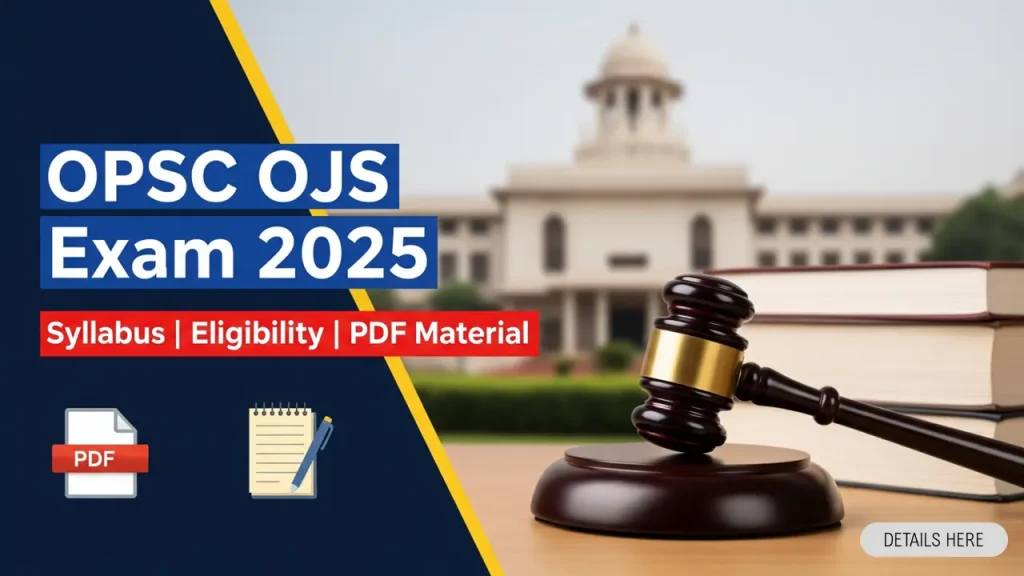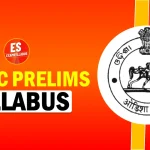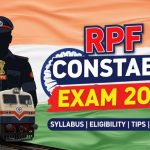The Odisha Judicial Service (OJS) examination, conducted by the Odisha Public Service Commission (OPSC), is a highly competitive exam for aspiring Civil Judges (Junior Division) in the state. Here’s a comprehensive guide covering the syllabus, exam pattern, eligibility, cut-offs, preparation tips, and recommended books.

OPSC Odisha Judicial Service (OJS) Examination: A Comprehensive Guide
The OJS exam is conducted in three stages:
- Preliminary Written Examination
- Main Written Examination
- Viva Voce (Interview)
1. Eligibility Criteria
To be eligible for the OJS examination, candidates must fulfill the following criteria:
- Nationality: Must be a citizen of India.
- Age Limit:
- Minimum Age: 23 years.
- Maximum Age: 35 years (as of the cut-off date mentioned in the official notification).
- Age Relaxation:
- SC/ST/SEBC and Women candidates: 5 years (Maximum age: 40 years).
- Persons with Disabilities (PwD): 10 years (Maximum age: 45 years).
- Ex-Servicemen: As per government rules.
- Government servants (Superintendent, Ministerial Officer, Assistant Law Officer, Translator in any department of Government or High Court or Courts subordinate to it) with more than 7 years of service are eligible up to 39 years of age.
- Educational Qualification:
- Must be a Law Graduate (LL.B.) from a University or Institution recognized by the Government and approved by the Bar Council of India.
- Candidates who are Translator or Civil/Criminal Subordinate or Superintendent or Assistant Law Officer in the Law Department of Government or in the High Court or in the Courts subordinate to it, having served for more than 7 years, are also eligible.
- Language Proficiency: The candidate must be able to speak, read, and write Odia and must have:
- Passed a test in Odia in Middle English School (Class 7) standard; OR
- Passed Odia as a subject in the Matriculation (Class 10) examination; OR
- Passed a test in Odia of Middle English School standard conducted by the Board of Secondary Education, Odisha.
- Number of Attempts: There is no specific limit on the number of attempts, provided the candidate meets the age criteria.
- Marital Status: A candidate having more than one spouse living will not be eligible unless exempted by the Government.
2. Exam Pattern
A. Preliminary Written Examination (Qualifying in nature)
- Type: Objective type with Multiple Choice Questions (MCQs).
- Total Marks: 100 marks.
- Duration: 1 hour 30 minutes.
- Number of Questions: 100 questions (1 mark each).
- Negative Marking: 0.25 (1/4th) mark will be deducted for each wrong answer.
- Qualifying Marks:
- General Category: Not less than 40% marks.
- SC/ST Candidates: Not less than 35% marks.
- Purpose: This stage is purely for screening candidates for the Main Written Examination. Marks obtained in the Preliminary Examination are not counted for the final merit list.
- Syllabus:
- The Constitution of India
- Code of Civil Procedure, 1908
- Code of Criminal Procedure, 1973
- Indian Evidence Act, 1872
- Indian Penal Code, 1860
- Limitation Act, 1963
- Transfer of Property Act, 1882
- Indian Contract Act, 1872
- Law of Succession (Indian Succession Act, 1925 and Hindu Succession Act, 1956)
- Specific Relief Act, 1963
- The Protection of Women from Domestic Violence Act, 2005
- Other relevant laws as notified by the Commission.
B. Main Written Examination (Descriptive type)
- Type: Descriptive (Conventional) written examination.
- Total Papers: 2 Compulsory Papers + 3 Optional Papers (candidates choose three out of five optional subjects).
- Qualifying Marks:
- Candidates must secure not less than 45% marks in aggregate.
- A minimum of 33% marks in each paper is required.
- Note: These are minimums for being called for the interview. The actual cut-off for selection will be higher.
- Syllabus:Compulsory Papers (150 Marks each, Duration: 2 hours 30 mins each)
- Paper I: General English
- Translation and retranslation of ten lines each (English to Odia and Odia to English).
- A short essay (about 150 words).
- Precis writing (about 300 words).
- One passage (about 500 words) with 5 questions.
- Paper II: Procedural Laws
- The Code of Criminal Procedure, 1973
- The Code of Civil Procedure, 1908
- The Indian Evidence Act, 1872
- Paper III: Law of Crime & Law of Torts
- Paper IV: Personal Law
- Hindu Law
- Mohammedan Law
- Paper V: Law of Property
- Transfer of Property Act, 1882
- Specific Relief Act, 1963
- Indian Limitation Act, 1963
- Paper VI: Law of Contract
- Indian Contract Act, 1872
- Sales of Goods Act, 1930
- Partnership Act, 1932
- Negotiable Instrument Act, 1881
- Paper VII: Jurisprudence and Constitution of India
- Paper I: General English
C. Viva Voce (Interview)
- Total Marks: 100 marks.
- Purpose: To assess the candidate’s general knowledge, legal knowledge, communication skills, mental alertness, critical powers of assimilation, clear and logical exposition, balance of judgment, variety and depth of interest, ability for social cohesion and leadership, and intellectual and moral integrity.
- Questions will generally not be outside the syllabus of the Main Written Examination. Broad national and international issues and matters of common interest in the field of Arts and Science may also be asked.
- Minimum Qualifying Marks: Candidates generally need to secure a minimum of 40% in the interview to be considered for the final merit list.
3. Cut-Off Marks (Previous Years – Illustrative)
Cut-off marks vary each year depending on factors such as the number of vacancies, the difficulty level of the examination, and the number of candidates appearing. Here’s an indicative trend based on past exams (exact figures may vary slightly depending on the source, always refer to official notifications):
Preliminary Exam (Qualifying Cut-off – e.g., 2022 trends)
- General: 40% (40 marks out of 100)
- SC/ST: 35% (35 marks out of 100)
Main Exam + Viva Voce (Final Selection Cut-off – e.g., 2022 Trends)
The final cut-off is based on the aggregate marks obtained in the Main Written Examination (sum of all papers) and the Viva Voce.
- OJS 2022 (Out of 850 marks: 2 Compulsory x 150 + 3 Optional x 150 + 100 Interview)
- General Male: ~499
- General Female: ~501
- SEBC Male: ~457
- SEBC Female: ~459
- SC Male: ~411
- SC Female: ~390
- ST Male: Data not consistently available (Lower than SC)
- ST Female: Data not consistently available (Lower than SC)
- OJS 2018 (Out of 850 marks)
- General Male: 87.374
- General Female: 77.273
- SEBC Male: 86.869
- SEBC Female: 74.747
- SC Male: 69.697
- SC Female: 58.081
- ST Male: 54.545
- ST Female: 51.010
It is crucial to note that these are past trends. Candidates should aim to score significantly higher than the minimum qualifying marks to secure a place in the final merit list.
4. Preparation Tips
- Understand the Syllabus Thoroughly: Go through the official syllabus for both Prelims and Mains. Identify common topics and differentiate between them.
- Master Bare Acts: For law subjects, Bare Acts are your Bible. Read them meticulously, understand the provisions, and memorize important sections. Most Prelims questions are directly from Bare Acts.
- Conceptual Clarity: Don’t just mug up. Develop a strong conceptual understanding of all legal principles. This is vital for the descriptive Mains exam and the interview.
- Practice Answer Writing (Mains):
- For the Mains exam, practice writing descriptive answers regularly.
- Focus on structuring your answers with clear introductions, relevant legal provisions, case laws, arguments, and conclusions.
- Pay attention to word limits and time management.
- Practice essays, precis writing, and translation for the General English paper.
- Solve Previous Year Question Papers: This is indispensable. It helps you understand the exam pattern, the type of questions asked, important topics, and time management.
- Mock Tests: Regularly take mock tests for both Prelims and Mains to evaluate your preparation, identify weak areas, and improve speed and accuracy.
- Current Affairs & Legal Developments: Stay updated with recent legal developments, landmark judgments, and amendments to laws. Read legal magazines, journals, and reliable online legal news portals. For general current affairs, follow a good newspaper (e.g., The Hindu, Indian Express) and a monthly current affairs magazine.
- Revision: Consistent and multi-layered revision is key to retaining the vast amount of information. Make short notes or flashcards for quick revision.
- Time Management & Study Plan: Create a realistic study schedule. Allocate sufficient time for each subject, prioritizing your weaker areas and high-weightage topics.
- Interview Preparation:
- Work on your communication skills, confidence, and logical reasoning.
- Be well-versed with your academic background and any practical experience.
- Stay updated on general knowledge and current national/international issues.
- Participate in mock interviews.
5. Recommended Books
A. For Prelims (All Subjects) & General Knowledge/English (Compulsory Paper I)
- Bare Acts: For all the law subjects mentioned in the syllabus (Constitution, CPC, CrPC, Evidence, IPC, Limitation, TPA, Contract, Succession, Specific Relief, Domestic Violence Act). This is the most important resource.
- General Knowledge:
- Lucent’s General Knowledge
- Manohar Pandey’s General Knowledge
- General English:
- High School English Grammar and Composition by Wren & Martin
- Objective General English by S.P. Bakshi (for practice)
- Current Affairs: Reputable monthly current affairs magazines (e.g., from Vision IAS, Shankar IAS, or other coaching institutes), daily newspapers.
B. For Mains (Law Subjects – Specific Texts)
While Bare Acts are paramount, for in-depth understanding, commentaries and standard textbooks are highly recommended:
- Constitution of India:
- D.D. Basu: Introduction to the Constitution of India
- M.P. Jain: Indian Constitutional Law
- M. Laxmikanth: Indian Polity (for concepts)
- Code of Civil Procedure (CPC):
- C.K. Takwani: Civil Procedure
- M.P. Jain: The Code of Civil Procedure (Student’s Edition)
- Code of Criminal Procedure (CrPC):
- R.V. Kelkar: Lectures on Criminal Procedure
- S.N. Mishra: The Code of Criminal Procedure
- Indian Evidence Act:
- Batuk Lal: The Law of Evidence
- Ratanlal & Dhirajlal: The Law of Evidence
- Indian Penal Code (IPC):
- Ratanlal & Dhirajlal: The Indian Penal Code
- K.D. Gaur: Textbook on Indian Penal Code
- Law of Torts:
- R.K. Bangia: Law of Torts
- Avtar Singh: Law of Torts and Consumer Protection Act
- Personal Law (Hindu Law & Mohammedan Law):
- Paras Diwan: Modern Hindu Law
- Aqil Ahmad: Mohammedan Law
- Dr. U.P.D. Kesari: Modern Hindu Law
- Transfer of Property Act (TPA):
- R.K. Sinha: The Transfer of Property Act
- Mulla: The Transfer of Property Act
- Indian Contract Act:
- Avtar Singh: Law of Contract & Specific Relief
- R.K. Bangia: Law of Contract
- Specific Relief Act: (Often covered within Contract Act books, also refer to Bare Act)
- Indian Limitation Act: (Refer to Bare Act and commentaries)
- Sales of Goods Act, Partnership Act, Negotiable Instrument Act: (Refer to Bare Acts and relevant commentaries/textbooks by Avtar Singh or R.K. Bangia)
- Jurisprudence:
- V.D. Mahajan: Jurisprudence and Legal Theory
- N.K. Jayakumar: Lectures in Jurisprudence
- The Protection of Women from Domestic Violence Act, 2005: (Refer to Bare Act and concise commentaries)
General Advice:
- Start with the Bare Acts for all subjects.
- For deeper understanding, use a good commentary/textbook.
- Practice writing answers for the Mains from mock tests and previous year papers.
- Stay updated with official notifications from OPSC for any changes in the syllabus or exam pattern.
Success in OJS requires consistent effort, a strong understanding of legal principles, and effective time management. Good luck!






















